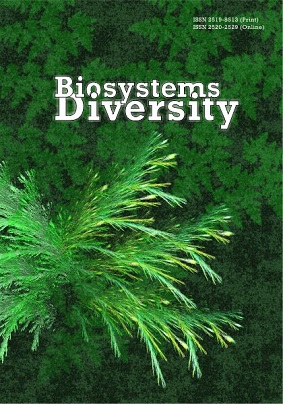Trophic links of the chaffinch (Fringilla coelebs) in transformed forest ecosystems of North-Eastern Ukraine
Trophic links of the chaffinch (Fringilla coelebs) in transformed forest ecosystems of North-Eastern Ukraine
Author(s): A. B. Chaplygina, O. Y. Pakhomov, H. A. Yevtushenko, V. V. BrygadyrenkoSubject(s): Agriculture, Human Ecology, Environmental interactions
Published by: Дніпропетровський національний університет імені Олеся Гончара
Keywords: Transformed areas; trophic groups; zoophages; phytophages; saprophages;
Summary/Abstract: The сhaffinch (Fringilla coelebs Linnaeus, 1758; Passeriformes, Fringillidae) is one of the most colourful forest species of birds living in Europe, West Asia and North Africa. The diet of this species was studied as a contribution to the conservation of the population of this species in transformed forests of the north-eastern part of Ukraine. Four forest ecosystems were studied: three model sites in oak forests, transformed under intensive recreation pressure, and one model site in a pine-oak forest. A total of 39 invertebrate taxa, dominated by Insecta (93.0%) were found. The orders Coleoptera (32.6%) and Lepidoptera (63.5%) prevailed in the diet of finch nestlings, the highest number of taxa (52.3–76.2%) was represented by phytophages. The phytophagous species also constituted the majority of the consumed prey items (44.0–55.6%). Environmental conditions provided an important effect on the diet structure. The most favourable foraging conditions for the species were found in protected natural areas. According to the analysis, the finch foraging efficiency was similar in all the studied sites. The highest biodiversity indices were found in a protected area of Homilshanski Forests National Nature Park. Results of the research have indicated the crucial role of Fringilla coelebs in the population management of potentially dangerous agricultural pests.
Journal: Biosystems Diversity
- Issue Year: 28/2020
- Issue No: 1
- Page Range: 92-97
- Page Count: 6
- Language: English

